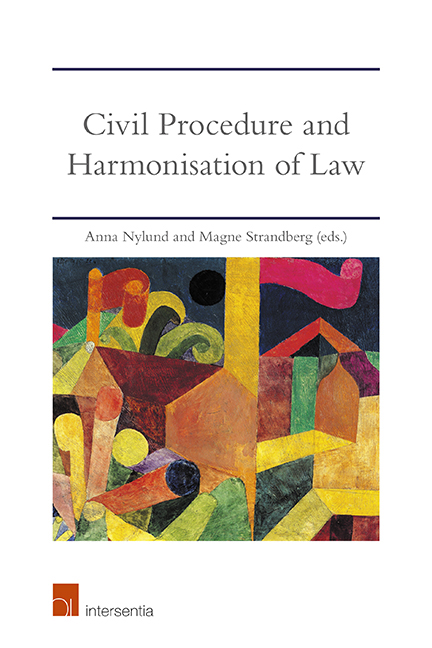Book contents
- Frontmatter
- Preface
- Contents
- List of Contributors
- List of Abbreviations
- Introduction
- EU Civil Justice at the Harmonisation Crossroads?
- The ELI-UNIDROIT Project: An Introduction and an English Perspective
- Europeanisation of Civil Procedure: Overcoming Follow-Up Fragmentation through Bottom-Up Harmonisation?
- Harmonisation or Fragmentation of National Law? An East Nordic Perspective
- An Examination of the Influence of European Union Law on English Civil Procedure
- The EU's Influence on Norwegian Civil Procedure through National Substantive Law
- Consumer Protection and EU-Driven Judicial Activism in the Netherlands
- The Role of the Judge in Consumer Cases – A German Perspective
- Ex Officio Application of the Unfair Terms Directive Cases against Consumers: A Swedish Perspective
- Ex Officio Application of EU Consumer Protection Law in Norwegian Courts
- Maintenance and Multi-Level Harmonisation: A European Union Perspective
- Family Maintenance and Multi-Speed Integration: A Norwegian Perspective
- Conclusions on Civil Procedure and Harmonisation of Law
- About the Editors
EU Civil Justice at the Harmonisation Crossroads?
Published online by Cambridge University Press: 30 March 2019
- Frontmatter
- Preface
- Contents
- List of Contributors
- List of Abbreviations
- Introduction
- EU Civil Justice at the Harmonisation Crossroads?
- The ELI-UNIDROIT Project: An Introduction and an English Perspective
- Europeanisation of Civil Procedure: Overcoming Follow-Up Fragmentation through Bottom-Up Harmonisation?
- Harmonisation or Fragmentation of National Law? An East Nordic Perspective
- An Examination of the Influence of European Union Law on English Civil Procedure
- The EU's Influence on Norwegian Civil Procedure through National Substantive Law
- Consumer Protection and EU-Driven Judicial Activism in the Netherlands
- The Role of the Judge in Consumer Cases – A German Perspective
- Ex Officio Application of the Unfair Terms Directive Cases against Consumers: A Swedish Perspective
- Ex Officio Application of EU Consumer Protection Law in Norwegian Courts
- Maintenance and Multi-Level Harmonisation: A European Union Perspective
- Family Maintenance and Multi-Speed Integration: A Norwegian Perspective
- Conclusions on Civil Procedure and Harmonisation of Law
- About the Editors
Summary
INTRODUCTION
At a conference in 2016, Professor Marcel Storme looked back at the plea he had made over 30 years ago, in 1986, in favour of the unification of civil procedural rules within the EU. He noted that the project that he later headed and that resulted in the so-called Storme Report of 1993 had removed a taboo and opened the doors to civil procedural harmonisation at the EU level. However, despite the time that has passed since Professor Storme's plea and the Storme Report, we have yet to see a comprehensive civil procedural harmonisation project in the EU. At the same conference, Professor Storme eloquently referred to Erasmus of Rotterdam in stating that, ‘Indeed, only fools can dream of such a simple approach.’ I will in this chapter argue that there are several current developments that indicate we may be closer than ever before to the harmonisation crossroads of EU civil justice.
First, it is pertinent to set out some of the background and context to these current developments in EU civil justice, taking the institutional perspective into account. In depicting the state of play, the various strands of civil justice will first be briefly presented (section 2.1). Next, the results of the institutional positions and regulatory choices made so far will be analysed (section 2.2). These practices and choices have led to the fragmented landscape of EU civil justice that we have today. This fragmentation in itself may be a trigger factor that occasionally calls for further harmonisation. However, there are additional ostensible pressure and trigger factors for harmonisation that will be presented (section 3), namely: (i) mutual trust, (ii) the rule of law, and (iii) soft law. Against this backdrop it will be possible to analyse whether any institutional and regulatory changes are likely to emerge at the potential harmonisation crossroads (section 4).
STATE OF PLAY
STRANDS OF PROCEDURAL DEVELOPMENT
Traditionally, the EU was not considered to have competence in the field of procedural law, and the Member States were considered to have autonomy over national civil procedure. The awareness that the Member States ‘procedural autonomy is de facto limited has emerged gradually, and various developments mean that today the traditional perception is no longer correct.
- Type
- Chapter
- Information
- Civil Procedure and Harmonisation of LawThe Dynamics of EU and International Treaties, pp. 11 - 34Publisher: IntersentiaPrint publication year: 2019
- 1
- Cited by



